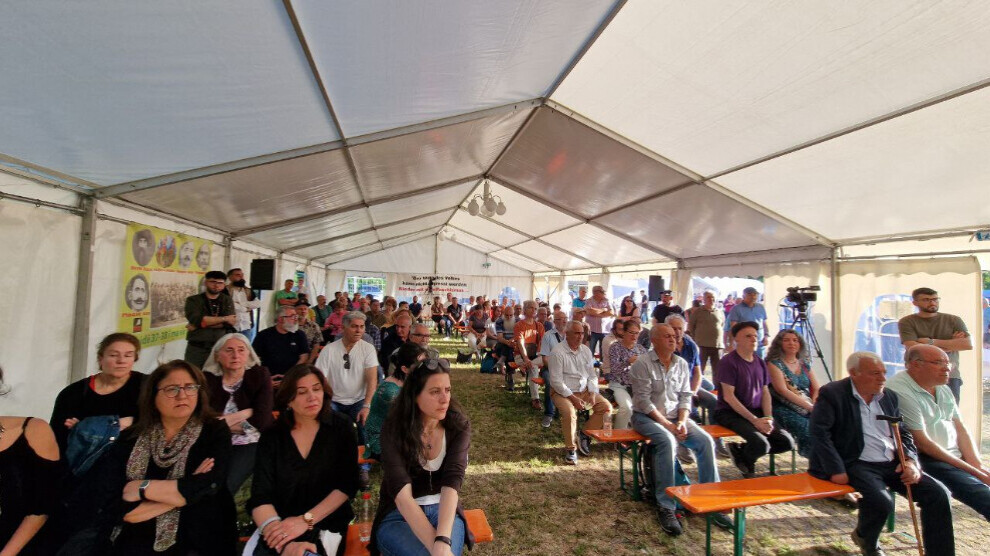15th European Dersim Culture Festival begins with a call for resistance
The European Dersim Culture Festival began with a call to resist assimilation and protect Dersim’s cultural heritage.
The European Dersim Culture Festival began with a call to resist assimilation and protect Dersim’s cultural heritage.

The 15th European Dersim Culture Festival began in Frankfurt, at Rebstockpark, under the slogan “We are not from Khorasan, we are not from Tunceli, we are from Dersim!” (Ma ne Xorasan, ma ne Tunceli! Ma Dersim me!)
This year, the festival was organized with the aim of resisting assimilation, preserving cultural values, keeping historical memory alive, and strengthening social solidarity.
Opening panel: The destruction of language, culture, and belief
The festival opened with a panel titled “The Destruction of Language, Culture, and Belief: The Middle East, the Kurds, and the Alawites.” The panel was moderated by Hülya Yer and featured Gülistan Kılıç Koçyiğit, Deputy Chair of the Parliamentary Group of the Peoples' Equality and Democracy Party (DEM Party); Hüseyin Şimşek, member of the Central Executive Committee of the Socialist Assemblies Federation (SMF); and researcher and author Selim Temo.
Photos of Seyit Rıza and two founding figures of the Kurdistan Workers’ Party (PKK), Ali Haydar Kaytan and Rıza Altun, were displayed at the panel venue.
Gülistan Kılıç Koçyiğit: Dersim is no longer silent
Gülistan Kılıç Koçyiğit opened her remarks by saying, “It is an honor for me to be here today.” She commemorated the 1938 Dersim Massacre and noted that for many years, this pain remained unspoken. “Now, our people are confronting their truth,” she stated. “It is not an easy process, but it is an honorable one.”
Kılıç also reflected on the ongoing transformations in the Middle East, highlighting the Kurdish people as key actors in this period of change. Pointing to the past peace process in Turkey, she remarked, “A climate of trust is essential for peace. We believe that such trust must be built step by step.”
Şimşek: Dersim Alawism is unique
Hüseyin Şimşek emphasized that the identity of Dersim cannot be defined through ties to Khorasan or Tunceli, and that Dersim Alawism has a structure distinct from Shiism in Iran and Arab Alawism.
He highlighted the pressures imposed from the Ottoman period through to the Republican era and stated that the 1938 massacre was jointly carried out by all political structures. According to Şimşek, while the people managed to preserve their culture in the aftermath, they maintained a deliberately distant relationship with the state.
Temo: The Kurds of Khorasan have always lived in the people’s memory
Researcher and author Selim Temo explained that his work on the Kurds of Khorasan is not the revelation of a new fact, but rather the academic documentation of a truth long known by the people themselves. He recalled that in Mem û Zîn, written by Ehmede Khani nearly 330 years ago, there are references to the structure of Kurdish tribes and society, including mentions of Kurdish tribes from Khorasan. During the panel, Temo read relevant excerpts from this work. Temo stated that historical documents, poetry, and a variety of sources provide significant evidence of the Kurdish presence in Khorasan, and that this knowledge has been preserved both in the collective memory of the people and in written records over time.
Culture, music, and solidarity come together
After the panel, artist Kivrem Erdal Timurlenk took the stage and performed. The festival grounds offered a rich atmosphere with stands for writers, traditional foods, cultural exhibitions, and handmade crafts.
Second day of the festival
The second day of the festival will begin at 11:00 a.m. A panel titled “Gender and Faith-based Destruction in the Context of Women’s Issues” will feature Elif Kaya, Zeynep Hayır, and Nuray Atmaca as speakers. The panel will be moderated by Songül Morsümbül.
At 1:00 p.m., the stage program will begin with a gulbang ritual led by Pir Zeynel Kete. Throughout the day, visitors will be able to enjoy musical performances, exhibitions, children’s workshops, and traditional games.
Artists scheduled to perform include: Çar Newa, Grup Munzur, Beser Şahin, Cemil Koçgiri, Zarokên Tenburxane, Zaza Woman, Diyar 23, Hazaran (Armenian music group), Delil Hıdır, and DAKME.
In addition, members of parliament, co-mayors, and Dersim representatives from Europe have also attended the festival.